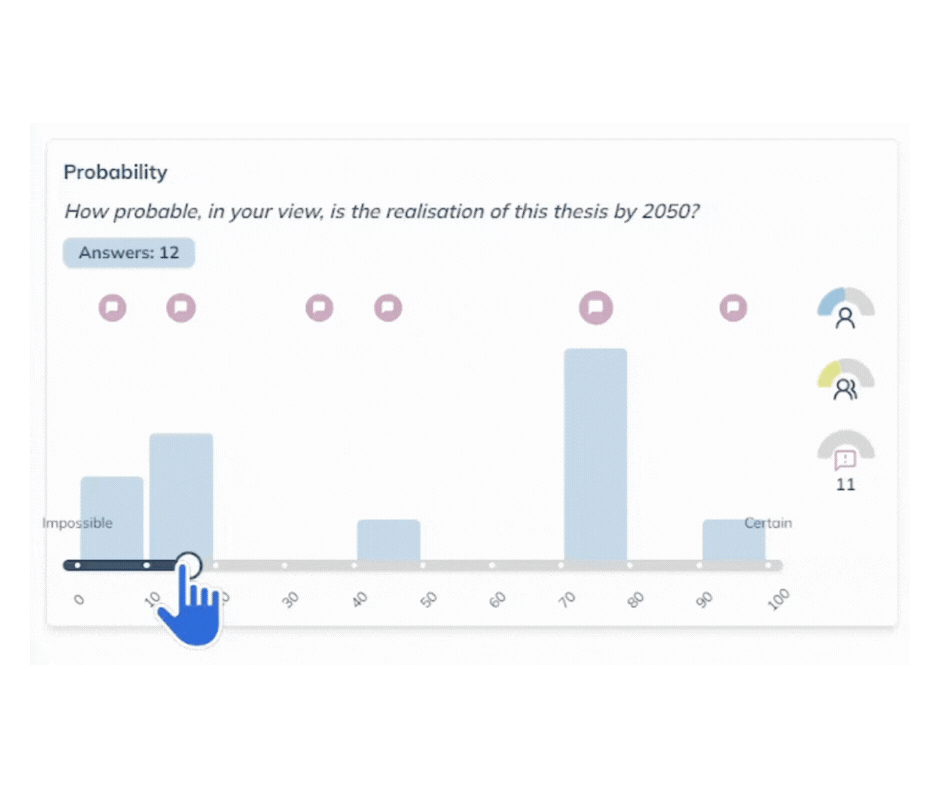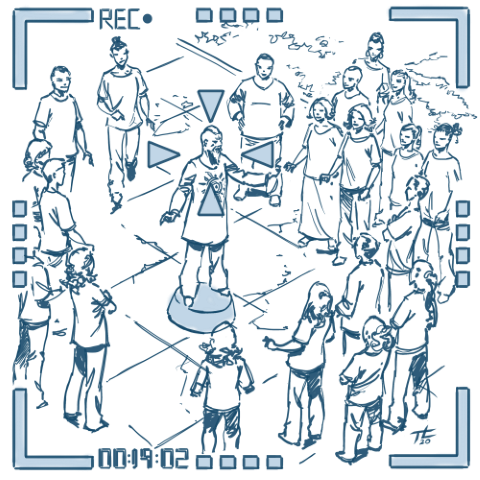Standard survey vs. Delphi
Choosing the right tool for your insight needs

Beyond opinion polls – knowing when you need more than a survey
Online surveys, polls, and questionnaires are invaluable for quickly gathering opinions or simple feedback. But what about tackling complex strategic questions, deep uncertainty, or synthesizing nuanced expert judgment? Are surface-level opinions enough when the decisions are critical? While standard surveys excel at capturing broad sentiment, they have fundamental limitations when well-reasoned insights are needed in complex, high-stakes topics.
This is where the Delphi method, particularly its modern Real-Time Delphi (RTD) evolution facilitated by advanced platforms, offers a fundamentally different and significantly more powerful approach. This article clarifies when a simple survey or questionnaire is the right choice, and explains why if the insights truly matter for critical decisions, investing in a structured Delphi process is essential.

When standard surveys and questionnaires are sufficient
Let’s acknowledge the strengths of standard surveys/polls/questionnaires. They are often the best tool when your primary goal involves:
![]() Gauging simple preferences, satisfaction levels, or opinions on well-defined topics.
Gauging simple preferences, satisfaction levels, or opinions on well-defined topics.
![]() Collecting basic demographic or factual data efficiently from large samples.
Collecting basic demographic or factual data efficiently from large samples.
![]() Measuring frequency or awareness regarding known items.
Measuring frequency or awareness regarding known items.
![]() Gathering broad, top-of-mind feedback quickly where deep justification isn’t the main focus (though open-ended questions can be included to gather some qualitative context).
Gathering broad, top-of-mind feedback quickly where deep justification isn’t the main focus (though open-ended questions can be included to gather some qualitative context).
If your needs fall squarely into these categories, a well-designed standard survey is likely your most efficient option.

Why Delphi excels where surveys fall short: The power of structured dialogue
The limitations of standard surveys become clear when facing the need for reasoned judgements and recommendations in complex, high-stakes topics. Delphi addresses these shortcomings through its unique structure, designed specifically for refining judgment and reaching a well-informed consensus:
![]() Iteration and collective learning: Surveys capture a static snapshot in time. Delphi is a process. Participants engage over multiple rounds (MRD) or a continuous period (RTD), receiving anonymized feedback on the group’s views and reasoning. This feedback loop is fundamental, allowing individuals to learn from diverse perspectives, reflect, and revise their initial judgments based on new arguments – something impossible in a one-off survey.
Iteration and collective learning: Surveys capture a static snapshot in time. Delphi is a process. Participants engage over multiple rounds (MRD) or a continuous period (RTD), receiving anonymized feedback on the group’s views and reasoning. This feedback loop is fundamental, allowing individuals to learn from diverse perspectives, reflect, and revise their initial judgments based on new arguments – something impossible in a one-off survey.
![]() Reasoning at the core: While surveys can include open-ended questions, Delphi systematically integrates qualitative justifications into the feedback loop, making it central to reflection and opinion change. It moves beyond top-of-head ideas to considered arguments.
Reasoning at the core: While surveys can include open-ended questions, Delphi systematically integrates qualitative justifications into the feedback loop, making it central to reflection and opinion change. It moves beyond top-of-head ideas to considered arguments.
![]() Synthesizing informed judgment, not just initial opinions: Delphi aims to harness considered judgment refined through reflection and exposure to peer reasoning. It seeks to build collective intelligence by exploring the range and basis of expert/stakeholder views, leading to more robust and reliable insights.
Synthesizing informed judgment, not just initial opinions: Delphi aims to harness considered judgment refined through reflection and exposure to peer reasoning. It seeks to build collective intelligence by exploring the range and basis of expert/stakeholder views, leading to more robust and reliable insights.
![]() Handling complexity and uncertainty: The structured, iterative approach is well-suited for ambiguous or controversial topics requiring systematic exploration and the integration of diverse, specialized knowledge.
Handling complexity and uncertainty: The structured, iterative approach is well-suited for ambiguous or controversial topics requiring systematic exploration and the integration of diverse, specialized knowledge.

Built for high stakes: Why Delphi is trusted when it truly matters
This rigorous, reasoning-focused approach isn’t just theoretical; it explains Delphi’s enduring appeal and continued use in critical domains where superficial opinions are insufficient. Its very genesis at the RAND Corporation during the Cold War stemmed from the need to grapple with unprecedented technological possibilities and geopolitical uncertainties, requiring a reliable method to synthesize diverse, often conflicting, expert judgments beyond the limitations of traditional meetings or analyses.
This foundational ability to structure dialogue under deep uncertainty explains its relevance today across numerous high-stakes fields. In healthcare, for instance, Delphi is indispensable for the painstaking work of developing robust clinical guidelines or defining Core Outcome Sets that ensure clinical trials measure what truly matters to both patients and clinicians. Complex public policy formation frequently relies on Delphi to navigate competing stakeholder interests, integrate technical evidence with societal values transparently, and build legitimacy for difficult decisions.
Similarly, leading corporations deploy it for crucial strategic planning and foresight exercises, helping them explore ambiguous future markets and align on robust pathways forward, while fundamental research initiatives across disciplines use it to synthesize cutting-edge knowledge and set informed priorities. In all these arenas, the common thread is the imperative to move beyond simple polling towards deep understanding and well-reasoned foundations – precisely what a well-executed Delphi process is designed to deliver.

Addressing the “overkill” perception: Modern Delphi is accessible, engaging, and user-friendly
Perhaps you’ve heard Delphi is too complex or resource-intensive – essentially “overkill” for anything but massive projects? That perception often stems from the experience of classic, manual Multi-Round Delphi (MRD), which was undeniably cumbersome. Managing rounds, compiling feedback, ensuring anonymity by hand was incredibly burdensome.
However, modern Real-Time Delphi, facilitated by next-generation platforms, fundamentally changes this narrative. These tools automate the complex logistics. More importantly, platforms like 4CF Halnyx 2.0 boast highly intuitive, user-friendly interfaces that make participation straightforward for experts and setup efficient for organizers. The result? The power and depth of the Delphi method are now accessible and efficient for a much broader range of important questions, offering profound insights without the prohibitive logistical or financial burden of the past. Furthermore, this enhanced user experience makes the process far more engaging for participants compared to static surveys or clunky older platforms, directly contributing to higher quality input and deeper insights.

Choose the right tool for the depth of insight required
Standard surveys and polls have their place for quick opinions and simple data gathering. But when you face complex problems, navigate deep uncertainty, require nuanced expert judgment, or need to build robust consensus grounded in shared understanding – when the insights truly matter – a simple survey falls short. The Delphi method, especially modern RTD facilitated by user-friendly, insight-focused platforms like 4CF Halnyx, provides the necessary structure, interactive feedback, and emphasis on reasoning. It’s the tool designed not just to ask questions, but to collectively think and arrive at deeper, more reliable answers. Don’t settle for surface-level opinions when your challenge demands deep collective intelligence.

Experience the next generation of Delphi
4CF Halnyx 2.0 provides the intuitive, powerful, and insight-focused platform needed to conduct effective Real-Time Delphi studies that deliver meaningful results.
Interested in Delphi and RTD? Explore our expert series:
4CF Delphi Expert Series offers comprehensive insights, drawing on extensive experience, covering everything from the fundamentals to advanced applications and the crucial role of next-generation platforms. Whether you're new to Delphi or an experienced practitioner, explore these articles to deepen your knowledge and enhance your results.






Explored these? Discover even more in our full Delphi series
Interested in Delphi and RTD? Explore our expert series:
4CF Delphi Expert Series offers comprehensive insights, drawing on extensive experience, covering everything from the fundamentals to advanced applications and the crucial role of next-generation platforms. Whether you're new to Delphi or an experienced practitioner, explore these articles to deepen your knowledge and enhance your results.
Explored these? Discover even more in our full Delphi series
Stay updated! Subscribe to our newsletter:
By subscribing to our newsletter, you consent to the processing of the provided data. The data controller is 4CF Sp. z o.o., its registered office is located in Warsaw, 10/14 Trzech Krzyży Square, postal code: 00-499.
We process your data solely for the purpose of sending information about 4CF Sp. z o.o. and its activities via e-mail. Your data will be processed until your consent is revoked through a link that will be included in each newsletter. The withdrawal of consent shall not affect the lawfulness of processing based on consent before its withdrawal. Providing your data is voluntary, but necessary if you wish to receive information about 4CF Sp. z o.o. and its activities. We may transfer the data to our suppliers of services related to the processing of personal data, e.g. IT service providers. Such entities process data on the basis of a contract with our company and only in accordance with our instructions. You have the right to request access to your personal data, its rectification, deletion or limitation of processing, as well as the right to lodge a complaint with the supervisory authority. More information about your rights and about the processing of your personal data can be found in our privacy policy.







